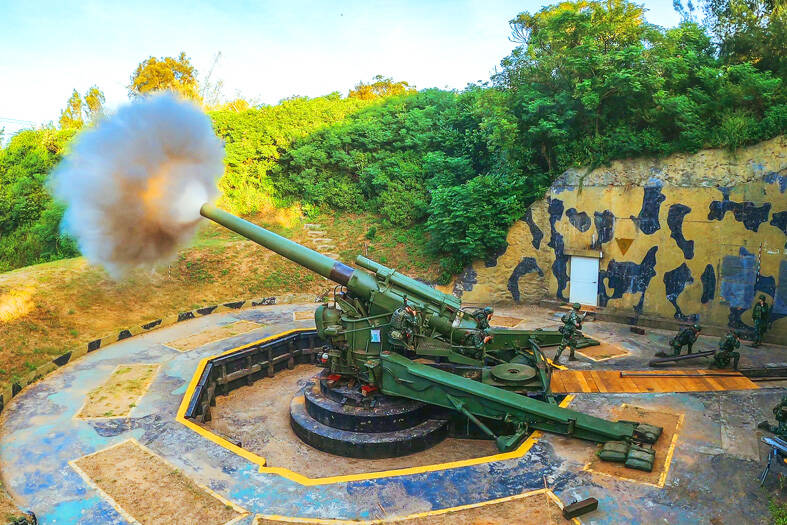The Executive Yuan plans to propose a national defense budget of about NT$630 billion (US$19.18 billion) for the next fiscal year, which is about 5 percent higher than this year, an official familiar with the issue said yesterday.
Despite the unprecedented increase in the budget, it still accounts for less than 3 percent of the nation’s GDP.
After Premier Cho Jung-tai (卓榮泰) held an annual projects and budgets review meeting for the 2025 fiscal year on Sunday, local media reported that the total annual budget expenditure is to be nearly NT$3 trillion and total annual budget revenues about NT$2.8 trillion.

Photo courtesy of the Ministry of National Defense
The national defense budget is said to be about NT$460 billion, and with special budgets and special funds, it would total about NT$630 billion.
The total budget has not yet been finalized and the principle is “to make both ends meet,” so if total annual budget expenditure exceeds NT$3 trillion, total annual budget revenues would not be far from it, the official said.
The government does not wish to have excessive debt, so projected expenditures would be adjusted after carefully considering expected revenues, they said.
The budgets are scheduled to be further discussed and approved at a meeting of the Executive Yuan in the middle of next month, so there would be more concrete and detailed plans by then, they added.
The Executive Yuan on Sunday said the compilation of the central government general budget for the 2025 fiscal year would follow the new government’s administrative policies, and ministries would draft policies and projects and allocate budgets accordingly.
The budgetary compilation would also proceed under the premise of fiscal discipline and taking into account moderate growth of expenditures and revenues, it said.
The Executive Yuan also said that not including the special budget for the Forward-looking Infrastructure Development Program, the budget for improving public infrastructure would see the highest increase, and that hopefully it would improve road traffic and pedestrian safety, and increase the adoption of electric vehicles.
Meanwhile, there would also be increased expenditure on science and technology development, grants from the central government to local governments and social welfare programs, it said.

MAKING WAVES: China’s maritime militia could become a nontraditional threat in war, clogging up shipping lanes to prevent US or Japanese intervention, a report said About 1,900 Chinese ships flying flags of convenience and fishing vessels that participated in China’s military exercises around Taiwan last month and in January last year have been listed for monitoring, Coast Guard Administration (CGA) Deputy Director-General Hsieh Ching-chin (謝慶欽) said yesterday. Following amendments to the Commercial Port Act (商港法) and the Law of Ships (船舶法) last month, the CGA can designate possible berthing areas or deny ports of call for vessels suspected of loitering around areas where undersea cables can be accessed, Oceans Affairs Council Minister Kuan Bi-ling (管碧玲) said. The list of suspected ships, originally 300, had risen to about

DAREDEVIL: Honnold said it had always been a dream of his to climb Taipei 101, while a Netflix producer said the skyscraper was ‘a real icon of this country’ US climber Alex Honnold yesterday took on Taiwan’s tallest building, becoming the first person to scale Taipei 101 without a rope, harness or safety net. Hundreds of spectators gathered at the base of the 101-story skyscraper to watch Honnold, 40, embark on his daredevil feat, which was also broadcast live on Netflix. Dressed in a red T-shirt and yellow custom-made climbing shoes, Honnold swiftly moved up the southeast face of the glass and steel building. At one point, he stepped onto a platform midway up to wave down at fans and onlookers who were taking photos. People watching from inside

Japan’s strategic alliance with the US would collapse if Tokyo were to turn away from a conflict in Taiwan, Japanese Prime Minister Sanae Takaichi said yesterday, but distanced herself from previous comments that suggested a possible military response in such an event. Takaichi expressed her latest views on a nationally broadcast TV program late on Monday, where an opposition party leader criticized her for igniting tensions with China with the earlier remarks. Ties between Japan and China have sunk to the worst level in years after Takaichi said in November that a hypothetical Chinese attack on Taiwan could bring about a Japanese

The WHO ignored early COVID-19 warnings from Taiwan, US Deputy Secretary of Health and Human Services Jim O’Neill said on Friday, as part of justification for Washington withdrawing from the global health body. US Secretary of State Marco Rubio on Thursday said that the US was pulling out of the UN agency, as it failed to fulfill its responsibilities during the COVID-19 pandemic. The WHO “ignored early COVID warnings from Taiwan in 2019 by pretending Taiwan did not exist, O’Neill wrote on X on Friday, Taiwan time. “It ignored rigorous science and promoted lockdowns.” The US will “continue international coordination on infectious